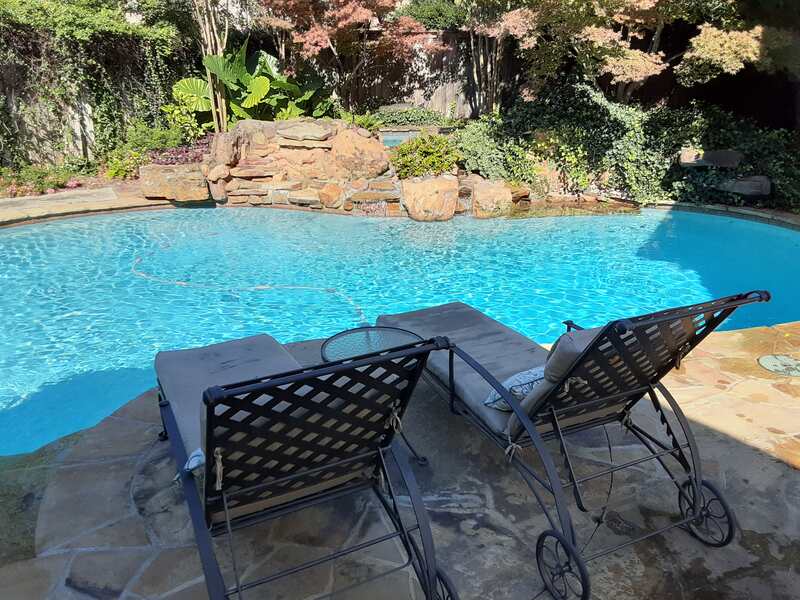
If you’ve owned a pool for very long, you’re well aware of the stress that often comes with pool ownership. “What ifs” can flood your brain as you begin to worry about how to properly care for your pool and maximize your investment.
At Liquidus Pools, we strongly believe that pool owners should enjoy their pool instead of fretting over it. That’s why we’ve created this pool maintenance guide to help you maximize your pool’s lifespan and minimize your stress.
The Importance of Proper Pool Maintenance
Routine pool maintenance offers more benefits than just extending the lifespan of your pool. It also creates a safe and clean environment for your friends and family to enjoy. Here are the benefits of getting routine pool maintenance:
Increases the Lifespan of Your Dallas Pool
Weekly pool maintenance ensures that all parts of the pool and its equipment, such as the filtration system and heater, are under close observation. This allows homeowners to learn of potential problems before they become catastrophes, such as replacing broken pool tiles to protect the shell of the pool.
Pool equipment, such as the pump and the heater, should also be inspected weekly to ensure that they work to the best of their ability. If there is a minor problem, these can be resolved quickly, getting your pool back up and running without having to completely replace these components.
Regular inspection and care of your pool will help keep your equipment running smoothly and improve the lifespan of your pool.
How Long Do the Various Pool Components Last?
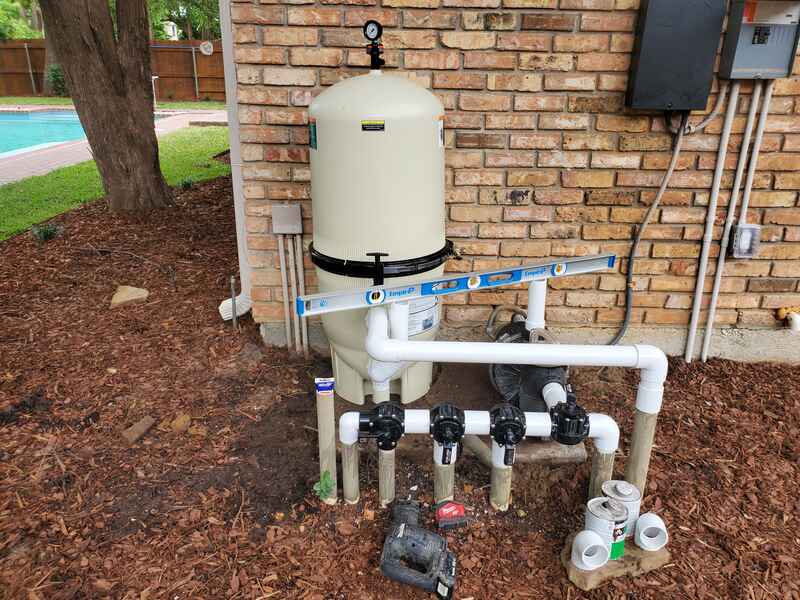
Each component of your pool has a lifespan that can be extended with proper care and maintenance. However, these are the average lifespans for the different parts of your pool:
- Concrete shell: Minimum of 25 years but could be longer with routine care.
- Pool cover: 25 years.
- Pool filter: 10 years.
- Pool pump: 10 years.
- Interior finish: Depending on the type you get, 10 – 35 years.
- Pool water heater: Eight years.
- Waterline tile: 15 years or more depending on the level of care.
Improves the Visual Appearance of Your Pool
No one wants to jump into a pool with murky water due to algae, debris, and dirt. Weekly maintenance ensures that these things are regularly removed from your pool, leaving the water sparkling and preventing the buildup of fungi and algae.
Weekly pool maintenance incorporates the adjustment of your water’s pH levels, which can aid in preventing dangerous microbes from spreading. This prevents scaling and algae from building up while also stopping common diseases or bacteria in their tracks. Protect swimmers’ health as well as the aesthetic appeal of your pool with routine pool maintenance practices.
Protects Your Investment While Maximizing the Life of Your Dallas Swimming Pool
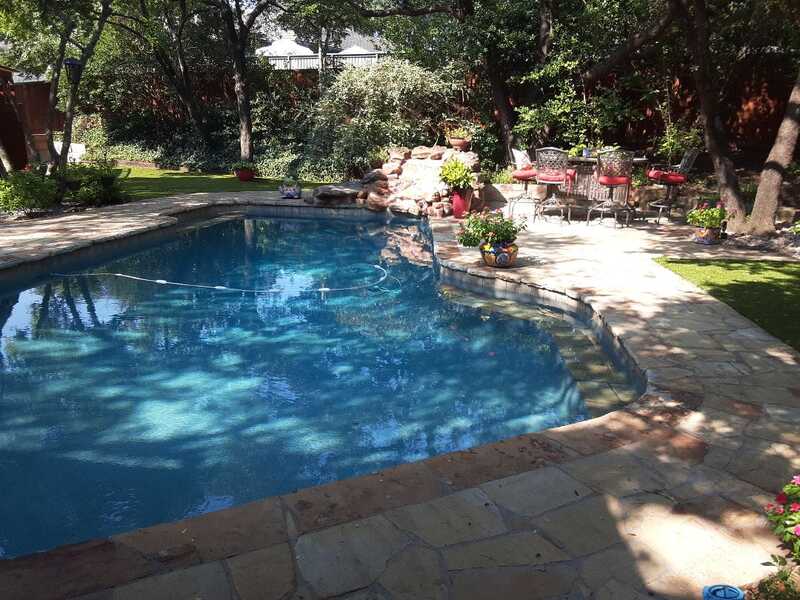
Routine pool maintenance may cost you a chunk of change every week but it does save money in the long run. Constantly having to replace broken pieces of pool equipment, shock the pool, replace broken tiles, etc. will cost you a lot more than weekly maintenance.
Your pool’s entire system and its shell will be better supported with routine maintenance, ensuring a longer lifespan and allowing your investment to stretch. Not to mention, a pool that is well cared for can add significant value to your home.
As a final cost-saving option, most pool warranties and pool part warranties are contingent on proper care of the equipment. If you can show that the pool part was defective while the pool was properly maintained, you can protect your investment when something goes wrong and have the warranty cover it.
Prevents Health Issues for Swimmers
The health of your pool also affects the health of the people who use it. Weekly pool maintenance will keep the pool’s pH levels at a level that is effective in destroying harmful pathogens but not aggravating the eyes, skin, nose, and ears.
Other illnesses that can stem from not properly maintaining your pool include:
- Skin infections
- Diarrheal infections/illnesses
- Swimmer’s ear
- Respiratory infections
Essential Pool Maintenance Tips
Every pool owner should perform essential pool maintenance steps regularly to ensure that their pool is cared for properly and is safe for swimmers. These pool maintenance steps are as follows:
Regular Water Testing
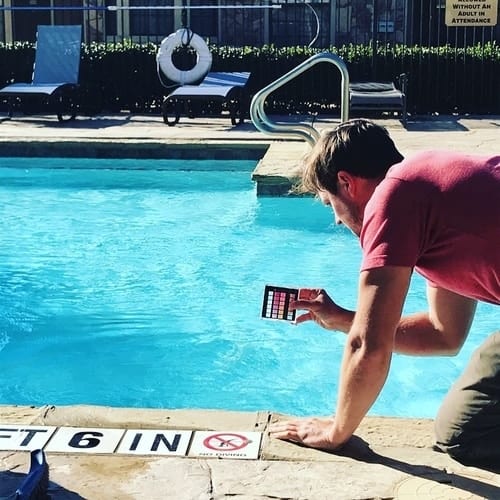
One of the first lines of defense for your pool water is chemicals. They ensure that harmful bacteria, such as e-coli, are destroyed, and protect against algae growth. Your pool’s water should be tested and balanced at least once a week to ensure the continued protection and longevity of your pool.
A pool test kit will give you a clear picture of what is happening with your pool’s water and its level of cleanliness. There are three types of pool test kits you can use:
Pool Test Strips: Pool testing strips can quickly measure the pH, alkaline, and chlorine levels in a pool. There are also specialty pool strips that can be used to measure total dissolved solids (TDS), salts, and other substances that may be present. To use them, you will want to follow these steps:
- Hold the strip underwater for about two to three seconds.
- Remove the testing strip from the water and keep the padded side facing up for about 15 seconds.
- Compare the strip against the label on the pool test strip packaging. Look for the colors that match the closest to the strip.
Pool Test Kits: A pool testing kit uses small water samples. The samples will change color depending on the alkalinity levels, pH levels, and chlorine levels present when mixed with the regent included in the kit. For a successful test, follow these instructions:
- Collect a water sample from your pool from at least 18” beneath the surface of the pool. Make sure you measure as precisely as possible following the pool test kit’s instructions. Too much or too little water or reagent will lead to inaccurate results.
- Add the correct amount of the reagent to the test tube. (Again, make sure to follow the measuring instructions on your testing kit.)
- Seal the sample shut and then gently shake it to mix the reagent with the water.
- Compare the sample colors against the label on the testing kit. Make sure you match it with the closest match.
Digital Pool Testers: If you are worried about accuracy when using a manual pool testing kit or strips, there is a digital option. You can connect the digital pool tester to your smartphone or other smart device, such as a tablet, to view your results and keep track of them. These devices tend to be a bit more expensive than the other two options, but they do provide more accurate results. Each digital pool tester is different, but most of them have a probe that you put in the water which it then samples and tests. Make sure you follow the instructions included with your digital pool tester carefully for the best results.
Balancing Your Pool’s Water
After you have tested your pool’s water, you will want to then use the results to properly balance your pool’s chemical levels. How much of each chemical you add will change depending on the results of your pool water test.
Balancing your pool correctly will prevent problems such as pool corrosion, skin, and eye irritation, and protect your pool equipment from damage. To balance the chemicals in your swimming pool, follow these steps:
- Adjust the alkalinity levels: A pool with low alkalinity will have a high acidity rate. Higher acidity rates leave your pool susceptible to pool corrosion. Your pool’s proper alkalinity levels should stay between 80 to 120 ppm. To increase the alkalinity in your pool, simply add the recommended amount of diluted sodium bicarbonate. To lower it, add dry or muriatic acid.
- Adjust pH levels: pH levels that are too low can damage the lining of your pool, making the surface brittle or stained. pH levels that are too high can cause cloudy water along with painful skin rashes due to irritation. The pH level of your pool should be between 7.4 to 7.8. To raise the pH levels, you need to add soda ash water. To lower it you need to add dry or muriatic acid.
- Balance the calcium hardness: The calcium hardness in your pool should be between 200 to 500 ppm. If you need to increase the calcium hardness in your pool, you can add in calcium hardness increase. If you need to correct it, you can partially drain the pool and add in more water.
- Sanitize your pool: You can sanitize your pool by adding in chlorine tablets, liquid or powdered chlorine. The chlorine levels in your pool need to stay between 1 to 5 ppm, to be the most effective in protecting swimmers and your pool from harmful bacteria.
- Measure Cyanuric Acid levels: Cyanuric Acid (CYA) is a stabilizer that is added to a pool after certain shocking chemicals have been used, such as di-chlor. CYA prevents UV rays from burning off the free chlorine in your pool, allowing it to be more effective in sanitizing and protecting your pool. It is especially important during the summer months when the sun beats down on your pool all day long. The measurement of CYA in your pool should stay between 30 and 70 ppm.
- Measure the dissolved solids: Total dissolved solids, TDS, measure how many solids are present in your pool’s water. Solids can be grime, salt, or algaecide. The TDS level in your pool should always be below 1,500 ppm. If the levels are too high, you will need to partially drain the pool and replace the water to remove the solids.
- Shocking the pool: Shocking your pool will significantly increase the amount of free chlorine that is available so that it can effectively destroy bacteria, algae, and chloramines. Your pool should be shocked on a weekly or biweekly basis to ensure that the water is properly sanitized.
- Retest the water a final time: Double-check your water’s chemical levels by ensuring that the alkalinity, pH, calcium hardness, and other measurements are within an acceptable range.
Pool Equipment Inspection and Maintenance
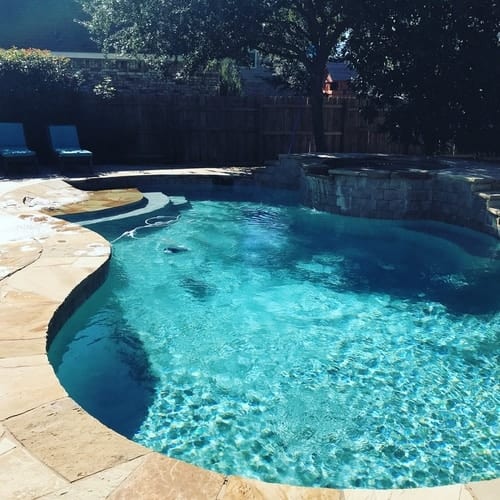
Part of your routine maintenance list should be to check your pool equipment for signs of wear and tear. You will want to check the following:
- Check the pool pump for leaks: This can be done by filling the pump with water from your garden hose and then turning the pump on. If it starts to run dry, this means that there is a leak somewhere in the system, and it needs to be fixed immediately.
- Empty the Pump Basket: As your pump is running, leaves, grass and other debris are being caught in your pump basket. To empty the baskets, turn your pump off, remove the pump lid, empty and rinse the basket, put it back in place, put the pump lid back on, and turn your pump back on.
- Relieve air pressure from the valve: To release air from your filter, you will need to twist open the air relief valve at the top of your filter. Once the air is completely removed, water will start flowing through the air relief valve. Twist the air relief valve closed and make sure it is secure. Next, check the pressure of your pool filter by reading the PSI gauge. If the pressure is above 20 PSI on a sand or D.E. filter, you will need to backwash the system. If it is a filter cartridge, you will want to clean the cartridges.
- Check the pool heater: You can check the pool heater by turning it on and then off. If an error message occurs, you will need to get the pool heater checked out by a trusted pool maintenance and repair specialist.
Preventative Measures for Pool Components
Other care steps you can take to ensure the cleanliness of your pool and prevent issues, such as cracks on your pool walls, are as follows:
- Using a leaf skimmer to remove leaves and other debris from the pool’s water.
- Brushing the pool walls, steps, and ladders to loosen hardened debris and dirt.
- Vacuuming the pool to remove any debris sitting on the pool floor, walls, or steps.
- Emptying skimmer baskets and automatic cleaner bags.
- Checking and cleaning the filter.
- Adding algaecide to prevent algae growth in your pool.
Proper Water Circulation to Protect Your Pool’s Structure
Algae and bacteria can quickly eat away at your pool’s walls and flooring. You can defend against this by running your pool’s pump for 8 – 12 hours every day. Proper water circulation allows your pool filter to trap contaminants, debris, and particles that would otherwise encourage algae growth in your pool. Ensuring that your pool has good water circulation also keeps the temperature of the pool cooler while aiding in the dispensing of chemicals throughout your pool’s system.
Professional Dallas Pool Service Benefits
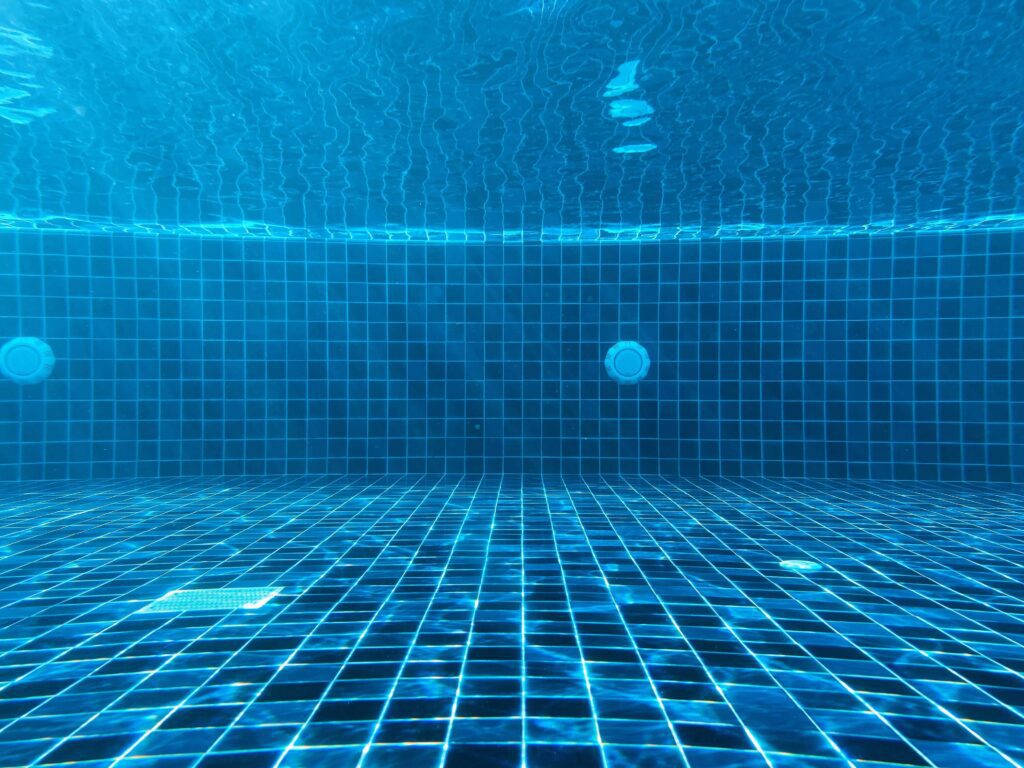
Many pool owners fret over the proper care of their pool, which takes away from the joy of actually using it. Liquidus Pool Services was founded on the idea that our professional pool maintenance specialists could help pool owners in the DFW Metroplex take their weekend back. We offer full pool maintenance services, allowing you the time to enjoy with your friends and family while we take care of your pool’s health. Here are some other benefits to enjoy when you let the pool experts from Liquidus Pool Services care for your pool:
- Peace of mind: Enjoy each and every swim knowing that your pool is properly cared for and protected.
- Customized cleanings: We offer customized pool maintenance options to fit your schedule. Whether you need monthly, bi-weekly or weekly pool cleaning, we can schedule we can work with your schedule to ensure your pool is properly cleaned. Have a large pool? We can service your pool multiple times/ week. Only need the water chemistry checked? We provide Chemical-Only services for your pool as well.
- Equipment inspections and maintenance: Our team of licensed repair technicians can handle the inspection and maintenance of all your pool equipment. Let us take the guesswork out of the equation when you’re trying to decide whether or not your pool equipment needs extra care.
- Save time and money: With proper pool maintenance by certified experts, the job will be done right every single time. This will reduce your overall maintenance costs and repair costs by keeping your pool and its entire system in tip-top shape.
Take Your Weekend Back With Liquidus Pool Services
Liquidus Pool Services offers a unique pool maintenance experience that is tailored to your pool’s needs. Dive into your pool and leave the rest of your cares behind by investing in routine pool maintenance with Liquidus Pool Services. Contact us today for more information or to schedule an appointment.
